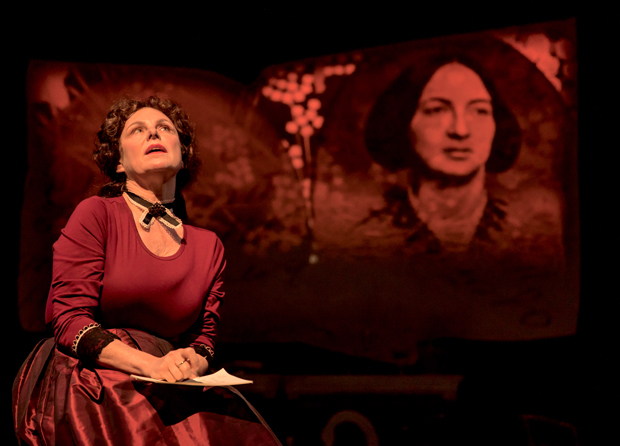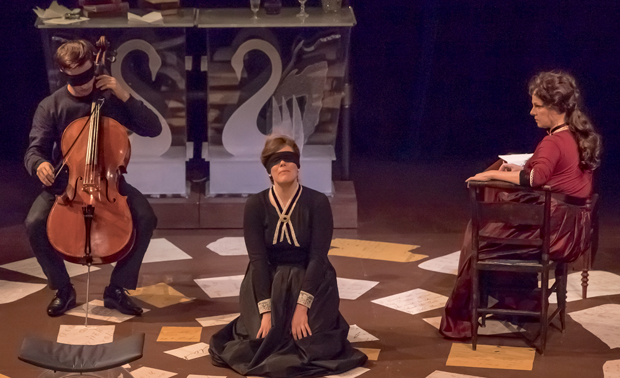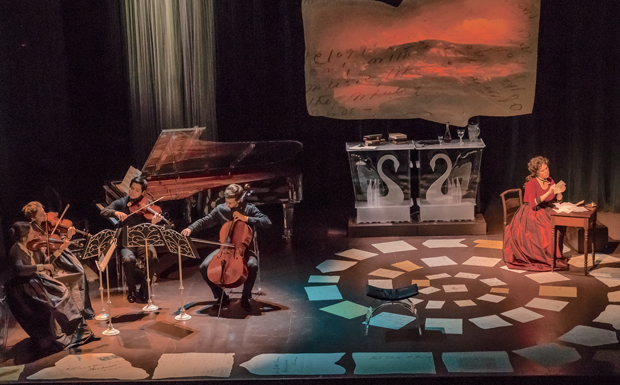Evoking the Life and Art of Emily Dickinson in Because I Could Not Stop

(© Shirin Tinati)
Because I Could Not Stop: An Encounter With Emily Dickinson hews faithfully to the Ensemble for the Romantic Century's usual theatrical-concert format, with the soundtrack made up of classical music performed live, and the interstitial dramatic material fashioned out of literary and primary sources. This history-based approach usually results in a kind of biographical collage rather than a conventional drama, as evidenced in last season's Van Gogh's Ear and Tchaikovsky: None But the Lonely Heart. If any subject's life is more deserving of such an elliptical treatment, though, it's Emily Dickinson's. Only long after her untimely death in 1886 (she was only 55) did the world become wise to her multifaceted poetry; her short life itself was, by comparison, resolutely undramatic, marked by a increasing turn toward hermeticism that many still try to explain.
In his script for Because I Could Not Stop, James Melo doesn't try to offer any explanations for her reclusive behavior later in life. Instead, he presents Emily Dickinson herself in a kind of solitary purgatory, going through her treasure trove of poems, reading some of them aloud, reciting others from memory, and just generally reminiscing about her life in a running stream-of-consciousness narration. Melo, through Dickinson's words, obliquely refers to bits of biography and historical context; such stage-setting pops up more directly in David Bengali's projections on a screen above a dresser in Vanessa James's homely one-room set. Mostly, though, Bengali conceives of colorful nature and insect imagery to reflect Dickinson's fascination with the natural world as reflected through her poems. The aim is less bio-drama than an evocation of the sensibility her life and work exudes: by turns caustically funny and morbidly introspective, but always open to the mysteries of human existence.

(© Shirin Tinati)
Because I Could Not Stop isn't just about Emily Dickinson, though. The show also prominently features the music of Amy Beach, the pioneering American female composer whose life only barely intersected with Dickinson's (she was born in 1867 and lived until 1944), but who, according to Melo in his musicology notes for the show, was similarly self-taught in the development of her artistic imagination. Otherwise, there's not much to link these two figures artistically: Dickinson was a proto-modernist in her poetic style, while Beach mostly maintained her Romantic temperament even as classical music was tending toward dissonance and atonality in the early to mid-20th century. Still, with performances as beautiful as the ones given by Victoria Lewis and Mélanie Clapiès (violin), Chieh-Fan Yiu (viola), Ari Evan (cello), Max Barros (piano), and especially soprano Kristina Bachrach singing some of Beach's songs, the somewhat arbitrary nature of bringing these two artists together almost doesn't matter. (Director Donald T. Sanders also sets Beach's Robert Browning song "Ah, Love, But a Day!" to a sequence in which Bachrach and Evan perform with blindfolds on — an impressive feat in and of itself.) If nothing else, Because I Could Not Stop will offer those unfamiliar with Beach's music ample reason to explore more of her work.
Other than the musicians, though, Because I Could Not Stop is essentially a solo show, with Angelica Page delivering Dickinson's words to us in the nonmusical portions. She does so in a manner that, at least at the performance I attended, seemed excessively affected in the first half, with Page's mannered line readings and lengthy pauses sometimes feeling more like she hadn't yet fully learned the part. (The fact that Sanders has her conveniently looking down at sheets of paper in the act of reading Dickinson's words throughout a fair amount of the first half didn't help alleviate such an impression.) Perhaps as the run goes on (through October 21 at the Pershing Square Signature Center), Page will fully settle into the role, because her performance becomes more compelling by the second half, where the pauses, sprung rhythms, and general improvisatory feeling of her line readings come to seem more in keeping with the irregular meters and structures of Dickinson's poetry.
Either way, one will still come away from Because I Could Not Stop feeling both awed by the musical and literary beauties on display but also a little hungry for a more substantial experience. There's not a whole lot here one couldn't learn by simply reading Emily Dickinson's poetry and listening to Amy Beach's music.

(© Shirin Tinati)










